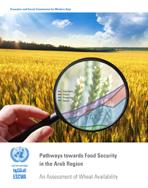No other crop better embodies concerns over food security in the Arab region than wheat. Wheat consumption per capita in the region has been high for the past few decades and is currently double the world average. Wheat contributes to more than one-third of the total calorie and protein intake of the population, reaching as much as 50 per cent in some countries. Given the prime role of wheat in the diet of their populations, Arab countries have exerted efforts during the past decades to secure wheat availability through a mixture of measures, ranging between higher production and greater imports. Given the contribution of wheat to improving food security in the Arab region, this study aims to assess wheat security by examining the prospects for higher wheat availability. This is achieved by developing a methodology that assesses the current production capacity with a view on land and water availability as limiting factors as well as by assessing the economic capacity to sustain wheat imports.
The study includes a review of the various regional initiatives that relate to wheat in order to reflect the results of the assessment of wheat availability into useful regional policy directions that can help the region to enhance wheat availability. The outcome of the review coupled with the results of the assessment can shed light on the pathways that Arab countries, collectively or individually, can follow to secure higher wheat availability levels and, as such, contribute to enhanced food security for their populations.






